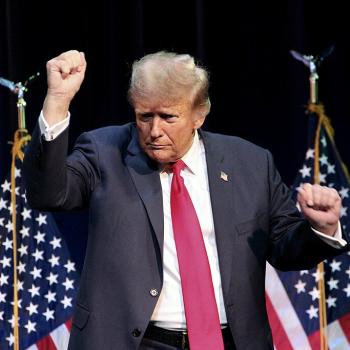I hope some of you see the Beowulf movie this weekend and post a comment about how it was.
A critic I really like, Stephen Hunter, has a good take on how the animation/real-life combo prevents any real acting or human emotions from happening. The same people who made this movie made “Polar Express,” which utterly creeped me out. Our faithful reader and commenter tODD usefully explained why, pointing us to this article about the “uncanny.”
Animation does make possible, though, effects of fantasy that are impossible to realistic drama. C. S. Lewis and J. R. R. Tolkien hated attempts to portray fantasy tales on stage, because in their realism they just could not pull it off, and phony special effects made it even worse. They didn’t think much of movies, either, though Lewis made an exception, interestingly enough, for the pioneering fantasy animation of Disney’s “Snow White.”
Mr. Hunter, for all of his good analysis, utterly misunderstands Beowulf’s times and the work’s literary structure. He obviously hadn’t read Tolkien’s definitive critical essay, “Beowulf: The Monster and the Critics,” as evident when he says this:
When the original was assembled (written? collected? sung? chanted?) around the embers back in the good ol’ 700s or so, no theory of psychology existed, so there was no storytellers’ need to conjure coherent behavior patterns or fully realized plots. Man was so powerless and all nature seemed arbitrary, so stories could be arbitrary, none more so than the epic poem of the Anglo-Saxon peoples (even if it told of Scandinavian adventures): The great warrior Beowulf fights and kills first Grendel, then Grendel’s ma; 50 years later he fights a dragon.
Unacceptably episodic today. No arc. No growth. Where’s the reveal? What’s the back story? Thus, Gaiman and Avary root the thing in family dysfunction, and the two monsters, plus the fire breather, are the manifestations of alpha-male pathologies for which many innocent people pay in blood, even if the alpha male is the only one on the planet capable of dealing with the terror he himself has unleashed.
Episodic? As Tolkien points out, each encounter shows the Monsters getting stronger and Beowulf getting weaker, intensifying the heroism, in the Germanic sense of courage in the face of doom. We also see the progression of the hero as a young warrior in the prime of life, learning by experience, until at the final confrontation is he is an old warrior near death, still fighting dragons for his people when he is 80 years old, until a new generation rises to take his place. And we could go on. The unity of the tale is far richer than what we postmoderns could come up with in our “theories of psychology.” And those times were in tune with much deeper forces than we are.
My worry is that the filmmakers, though they seem faithful to the original plot, may also be oblivious to what it means. Still, Hunter lauds the fight scenes to the sky. And, in what I didn’t realize, many theaters are showing it in 3-D! Only with cool glasses! So, at the very least, it should be great fun. But I can’t see it this weekend, so I need you to tell me.











